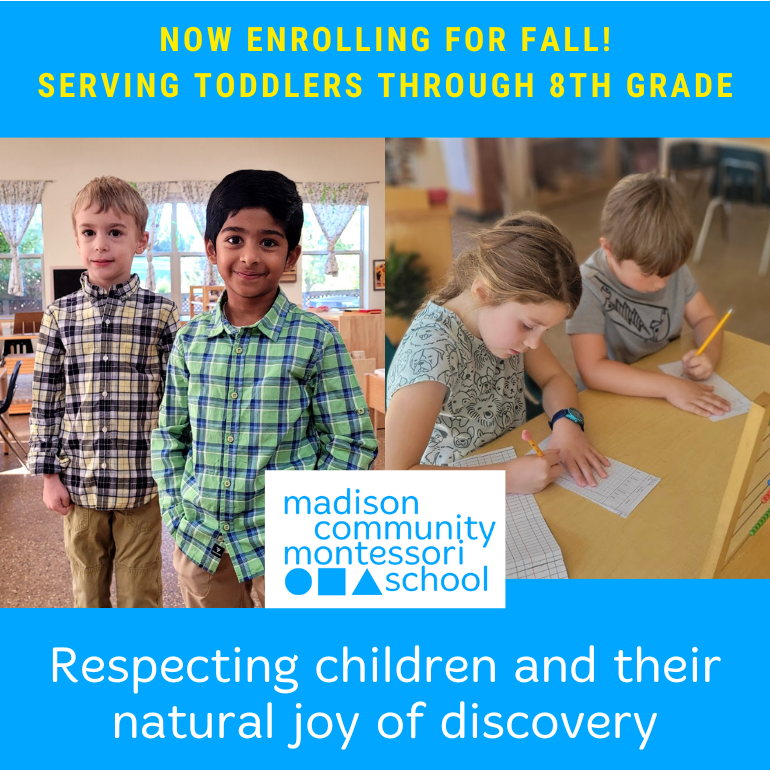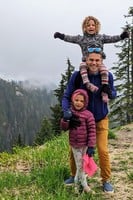When you arrive at MCMS, you can’t help but notice the beauty of the rolling farmland all around our building. The colors, smells, and shapes are a thrilling, sensorial experience for children, families, and guides each day, through all seasons. It’s no wonder that Dr. Montessori had such a strong message for future generations: connect children to the land. She specifically outlined the necessity for 12 to 18 year-olds to connect to society through farming. Montessori’s term for this aspect of the pedagogy is “erdkinder.”
She wrote, “...work on the land is an introduction both to nature and to civilization and gives a limitless field for scientific and historical studies...This means that there is an opportunity to learn both academically and through actual experience what are the elements of social life. We have called these children the "Erdkinder" because they are learning about civilization through its origin in agriculture. They are the "land-children,” (From Childhood to Adolescence, pg. 68). Making time to prepare our outdoor environments is an integral part of each level’s curriculum. Our Adolescent program celebrates the land through multiple visits to Hidden Savanna Farm, building and maintaining gardens outside their classroom, and hands-on learning about permaculture. They also participate in two annual visits to Nature’s Classroom Institute, located in Lake Geneva, to learn more about the ecosystems of Wisconsin and the connection between humans and the land.
Younger classrooms select the types of seeds they’d like to grow in their garden boxes and playground planters. By Spring, soil, hay, and the necessary tools are out on the playground, ready for students and guides to prepare the outdoor environments. By the end of the school year, we are lucky to see sturdy stems shooting up from the soil and maybe a flower or two on the vines of the pumpkins.
Due to the school calendar, it’s rare that students get to see, pick, and taste the actual herbs and vegetables before graduation. Thankfully, the summer session campers help maintain the gardens over summer. Children’s House students carefully water each plant and observe as the broccoli, tomatoes, and mint continue to grow in the outdoor classroom. The ability to sample red cabbage and chives offers the additional opportunity to taste their efforts and potentially sample a new food. Caring for the outdoor environment and seeing the benefits of such are joyful lessons in practical life and the senses for these two-to-six year-olds. 
Our elementary summer camp added another level of skill and excitement to our harvesting possibilities last year. Elementary students help harvest the vegetables and use the kitchen to prepare snacks of salads, kale chips, and rhubarb crisp. There is a deep connection to the Botany curriculum as students can see which part of the plant - the root, stem, flower, or leaf - is the part they are used to eating. They can also try other aspects of the plant and learn about the flavors. For example, while the students were most experienced with broccoli florets, they also learned about using the broccoli stems in salads and stir fry. Outer cabbage leaves, while they don’t look like what you typically see for sale in a grocery store, can be made into sauerkraut. Now we’re learning about chemistry!
There are many ways to engage in nature’s bounty from home, as well. From birth, children begin to learn through their five senses. Growing, caring for, observing, and tasting in a garden are easy ways to involve your children in the process of caring for the earth and providing their own nourishment. And, if you have an abundance, you can share! During our first session, Elementary summer campers organized a free farmer’s market for families at pick-up. Learning about the interdependence of humans and nature is a simple way to connect your family to the community and help your children understand how they can contribute to society.


